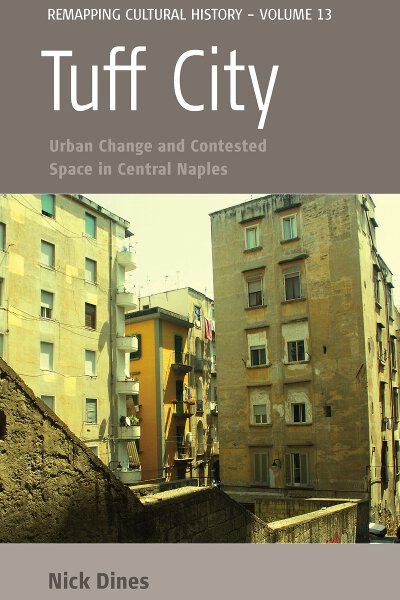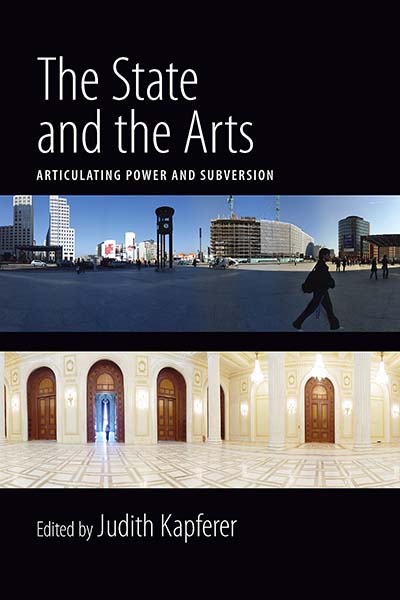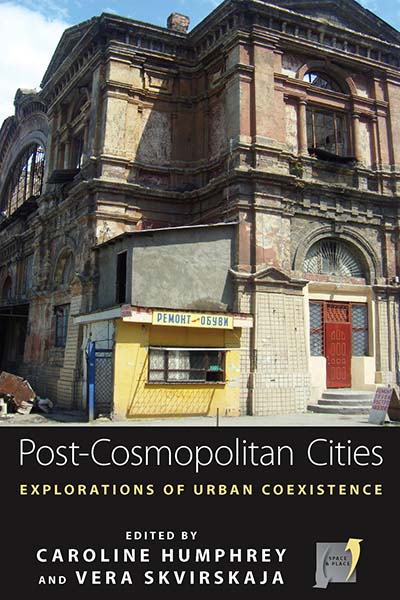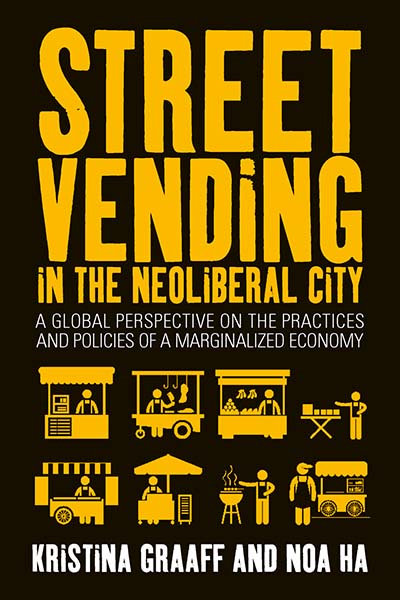
Series
Volume 13
Remapping Cultural History
Email Newsletters
Sign up for our email newsletters to get customized updates on new Berghahn publications.
Tuff City
Urban Change and Contested Space in Central Naples
Nick Dines
364 pages, 20 figures & maps, bibliog., index
ISBN 978-0-85745-279-5 $150.00/£115.00 / Hb / Published (February 2012)
ISBN 978-1-78238-911-8 $39.95/£31.95 / Pb / Published (March 2015)
eISBN 978-1-80758-256-2 eBook
Reviews
“Nick Dines draws on over a decade of intensive interdisciplinary research—history, politics, cultural studies, social geography, and anthropology— …[and] does a fine job of weaving together the competing narratives to offer a penetrating analysis of the contestation over public space embedded in discourses about civility and citizenship. He…also addresses global questions about citizenship, urban renewal, the inequality of zoning, and the securitization of public space. As such, this book could serve as a model for the analysis, critique, and comparison of other urban renewal projects in cities around the global north because Dines methodically and subtlely makes the local speak to global questions.” · American Anthropologist
“…this book offers a necessary contribution to the field: a recent take on a Mediterranean city that many people might rashly presume to know by reputation alone. Naples, the shameful, uncontrollable and uncontrolled metropolis is certainly prime fodder for anthropological study. At the same time, and helpfully for urban anthropologists, Dines seeks to dismiss Naples’ exceptionalism, presenting it instead as an ‘ordinary city’.” · OAC Press
“Recognising Naples’ uniqueness, Dines supplies theoretical and analytical tools for understanding urban regeneration…, thus fostering the kind of case study-focused ethnographic research that meets the urgent need to think across different urban experiences. Each case study presented in the book invites reflection upon the implications of political discourses about public space, as well as upon the rhetoric of participation and inclusiveness. Collectively, the case studies show the importance of considering different social groups’ divergent ideas and uses of space when studying spatial conflict. Complexity thus becomes an element to be valued and acknowledged in the urban project—in Naples and in contemporary cities elsewhere.” · Society and Space
“Naples must be one of the ethnographically most researched cities in the world. In this multi-method study of three areas of urban regeneration, however, Nick Dines breaks new ground by cross-cutting traditional methodological divisions to produce an intensely detailed and conceptually original analysis of a recent phase in Neapolitan history… By combining ethnographic observation over many years with both interviews and surveys, Dines breaks with narrow disciplinary habits, and contextualizes, historically as well as culturally, key events and movements that have shaped the city’s present-day configuration.” · Qualitative Research
“This is a perceptive book and worthwhile read for the true urbanist. It effectively demonstrates, and even showcases, the value of ethnography as a methodology, and any reader would be appreciative of the pointed detail of the archival research. The lessons it offers from Naples on the politics of public space will be of value to anyone studying the contemporary city.” · The AAG Review of Books
“Nick Dines’ painstaking study is a fitting and welcome contribution. Drawing on meticulous and extensive fieldwork conducted during the period of urban renewal dubbed the ‘Neapolitan Renaissance’, the book provides an extremely innovative perspective on Naples compared to the mainstream literature…From the outset, the study acts as a powerful tool of deconstruction of the discourses that have framed the city in the contemporary era. Atavistic backwardness, violent plebeianism, irresolvable passivity, unstoppable passion and an irreparable lack of civicness have been accorded varying levels of significance over the course of time but nonetheless remain a permanent feature of all narratives about Naples.” · Il Manifesto
“…a well-written, lively and stimulating study… Current public debates on the so-called Neapolitan Renaissance of the 1990s have often been reduced to the simplistic refrain that ‘it was all a question of image’. Tuff Cityinstead returns to the city’s recent past to critically engage with the myriad changes that took place, including shifts in public discourse.” · Il Matino
“This is an important book. In a whole series of ways this study of contemporary Naples will set a bench-mark for urban studies and the way urban history is carried out. It is a book about Naples and thus about the particularities and peculiarities of that specific city. However, this is also a book which goes way beyond Naples itself. It has a lot to tell us about the way the city can and should be studied – about urban studies methodologies – and in this area it is highly original and in some ways sets a new agenda for other researchers, historians, anthropologists, ethnologists, and those using cultural studies approaches.” · John Foot, University College London
“This is one of the best books I have read: beautifully written and extremely well researched (a refreshing mix of archival research and participant observation) and superbly theorized, with an impressive knowledge of the range of urban theory, as well as meticulous historical contextualization.” · Jo Labanyi, New York University
“…[A]n interesting and readable text. It is scholarly, ambitious in scope and well written.” · Victoria Goddard, Goldsmiths, University of London
Description
During the 1990s, Naples’ left-wing administration sought to tackle the city’s infamous reputation of being poor, crime-ridden, chaotic and dirty by reclaiming the city’s cultural and architectural heritage. This book examines the conflicts surrounding the reimaging and reordering of the city’s historic centre through detailed case studies of two piazzas and a centro sociale, focusing on a series of issues that include heritage, decorum, security, pedestrianization, tourism, immigration and new forms of urban protest. This monograph is the first in-depth study of the complex transformations of one of Europe’s most fascinating and misunderstood cities. It represents a new critical approach to the questions of public space, citizenship and urban regeneration as well as a broader methodological critique of how we write about contemporary cities.
Nick Dines lived and worked in Naples for seven years. He is research fellow in Sociology at Middlesex University, London.




